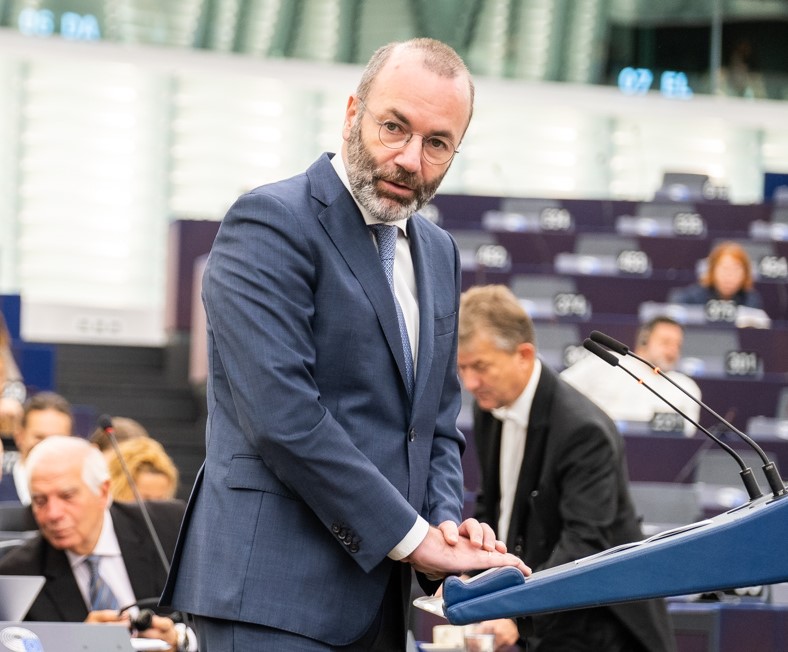As recent election results in Italy and Sweden have shown, traditional conservative parties in Europe are losing support as voters flock to the far-right. Many are calling it a crisis for conservatives, who now face a choice between co-opting the far-right, mimicking it to survive, or rather trying to stay true to their values.
Despite the electoral surge, it is still too early to say if voters opting for the far-right is a fundamental political shift, according to Senior Analyst Eoin Drea from the think tank Wilfried Martens Centre in Brussels – the official think tank of the European People's Party (EPP). For Drea, there is a clear answer on whether conservatives should absorb the far-right to weather current political storms.
"There is no path to long-term sustainability to out-right the far-right. We should remain a party of the centre-right, even if it may not be attractive at the moment," Drea told The Brussels Times.
The recent election results do not equate to a fundamental shift to the far-right, and Drea believes that not all of the 25% of Italians who voted for Brothers of Italy are far-right.
"There is a group of floating voters attracted to the far-right because they feel the state is failing them personally and institutionally. They feel the need for more protection against globalisation, immigration and the constant crises, which established parties haven't done."
Lambasted for Italy visit
The conservative group in the European Parliament – European People's Party (EPP) – hopes it can steer far-right parties toward mainstream politics.
However, it is proving not to be a popular strategy. The EPP leader, Manfred Weber, has faced criticism within the European Parliament after a visit to Italy in early September to back ex-premier Silvio Berlusconi and his party Forza Italia's campaign in the Italian elections.
Forza Italia remains part of the EPP group, but for the elections on 25 September entered into a right-wing electoral coalition with Giorgia Meloni's Fratelli D'Italia and Matteo Salvini's Lega, both on the far-right. Weber stressed that the coalition was a clear "guarantee" for Europe, pointing out the differences in Poland and Hungary, where only far-right parties govern, according to Euractiv.
The EPP hopes that Forza Italia can veer Meloni and Salvini closer to mainstream European politics. Yet the EPP tried the same strategy with Hungary's Viktor Orbán and his Fidesz party before Orbán quit the group last year.
Many MEPs have cast doubt over the EPP's strategy. This week, German MEPs sent a letter to the group's leader Manfred Weber, calling on him to use his position to pressure Forza Italia to not continue with their electoral pact with the far-right.
Italian MEP Laura Ferrera from the Five Star Movement is also unconvinced. "Manfred Weber must explain to all Europeans why the party of De Gasperi, Adenauer and Schuman, the founding fathers of the European Union, sells out its identity and values in Italy to the far-right Eurosceptic positions," she told Euractiv.
Related News
- 'Hungarians will not become a mixed race': Orbán's latest tirade sparks new row
- UK PM Truss already under pressure after budget causes pound sterling to collapse
- Italy confirms far-right shift in Sunday's elections
Asked if Weber has chosen the correct strategy in Italy, Drea believes the subject is being heavily debated in the EPP, but whether it works or not, will be down to Giorgia Meloni. "The strategy is designed to give parties like Meloni's the opportunity to adopt more responsible policies and become part of the mainstream."
"The key job of the centre-right is to shift the gravity back towards the centre," Drea added. "Even if governances and alliances are there, the EPP should ensure the gravity is as close to centre right as possible."
The right strategy to win back voters
Drea points out how support for far-right parties in Denmark and Finland has significantly dropped after they went from the fringes to the political mainstream. In Italy, Salvini's Lega massively underperformed in this year's elections, with voters punishing them for having been in government.
Yet political cultures vary in each country and it isn't clear that coopting the rhetoric of the far-right would take the edge off their force in other countries.
In France's 2022 presidential elections, the leader of traditional right-wing party the Republicans' Valerie Pecresse railed against immigration, a policy commonly associated with the far-right, and won just 4.8% of the vote – the worst election in the party's history. Meanwhile, National Rally leader and far-right figurehead Marine Le Pen focused on purchasing power and got 23% of the vote to make it into the final round.
For Drea, the most credible strategy to win back voters from the far-right is to focus on the bread-and-butter issues that concern voters during a crisis. At the moment, these encompass war, energy and inflation, after a decade of income stagnation in several countries.
"We cannot get lost in a narrative of sustainability and the green deal. They're important, but not the number one issue for voters right now."

